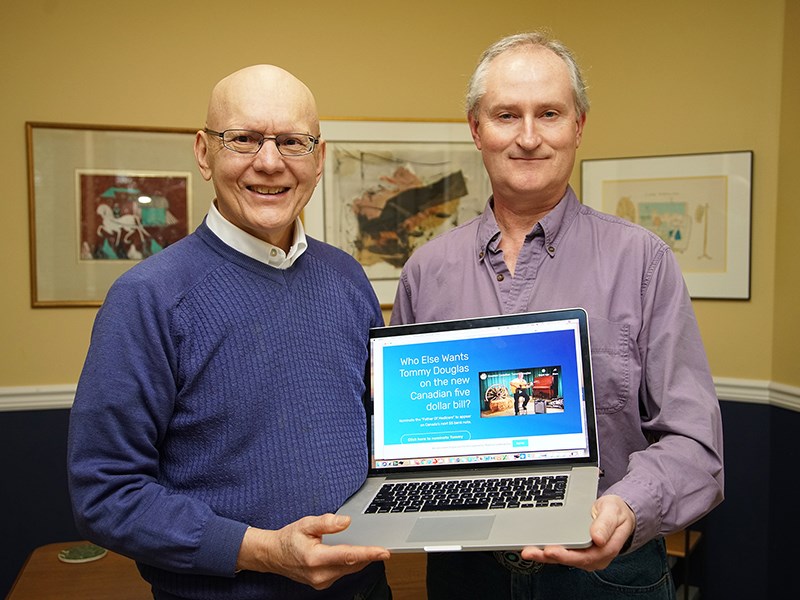A Powell River-based initiative has been launched to have Canadian icon Tommy Douglas as the new face on the next $5 bill.
A website has been set up by Powell River resident Robin Murray, said Ron Woznow, also from Powell River, to honour the so-called father of Canadian medicare, and encourage people to vote for Douglas as the new portrait on the next $5 bill. The website is part of a campaign the pair have devised to give Douglas the recognition.
“The significance is it reminds us that what differentiates us from, for example, our neighbours to the south, is that we have a safety net of medical assistance: our national medicare program,” said Woznow. “We don’t go bankrupt if we have a heart attack or a stroke, things that would cost hundreds of thousands of dollars in the United States.”
That’s the significance of having Douglas on the new $5 bill, he added.
Woznow said Douglas was a great Canadian and deserving of this honour. He said he and Murray saw Douglas as an innovator.
“He saw a challenge to a majority of Canadians and he addressed it,” said Woznow. “Having somebody who demonstrated that rather than just dealing with personal gain, he saw something that was important to everybody, and that’s where he threw his energy.
“To us, that’s a great lesson for young people. We’re all benefitting, and what could be a greater lesson than to have a young person growing up, saying, ‘wow, I’m a Canadian and part of being a Canadian is that we look at the common good rather than how much can I accumulate.’”
Murray said he is originally from a community close to Weyburn, Saskatchewan, where Douglas served as a provincial and federal representative. Murray was also born in 1966, which is the year medicare took effect nationally. He said he has an affinity for Douglas.
In terms of the initiative being launched here in Powell River, the community has demonstrated, because of its isolation, that it has had to learn to do things, according to Woznow.
“We have all kinds of innovators who have grown up and lived in Powell River,” said Woznow. “When Robin and I were talking about Tommy Douglas, we said there’s a lot of Tommy Douglases around here because they have had to be innovators. There are lots of examples here where people have put aside their personal gains and looked for the larger group that could benefit.”
While Douglas was a Canadian politician, Woznow said the initiative to get him on the $5 bill is apolitical.
“Tommy Douglas was a man of the common man,” said Woznow. “What could be more appropriate to have him on a $5 bill, rather than a $100 bill?”
By having a website, Woznow and Murray are hoping the campaign to have Tommy Douglas on the next $5 bill will gain national attention. Woznow is also hoping social networks light up with the initiative, to further spread the campaign nationally. People are encouraged to share on social media, he said.
“People are getting really excited and finding that this is really important to them,” said Woznow, who has enlisted eminent Canadians such as politician and jurist Justice Tom Berger, who said he was pleased to have his name used in association with the campaign.
“We are going after people like Tom who carry a lot of weight,” said Woznow. “We have his endorsement and support for this program to get Tommy on the $5 bill.”
The website for Tommy Douglas can be found at tommydouglasfornewcanadianfivedollarbill.ca. It includes links to the Bank of Canada website for choosing a portrait subject for the new $5 bill. The call for nominations is open until March 11, 2020.
According to the Tommy Douglas website, the father of medicare saw his medicare plan enacted in Saskatchewan in 1962 and later by the federal Lester B. Pearson government in 1966. His social activism inspired many Canadians from coast to coast, the website states.
“Douglas was defined by his altruism and his belief that the role of government is to help create a better society and a better Canada,” according to the website.



